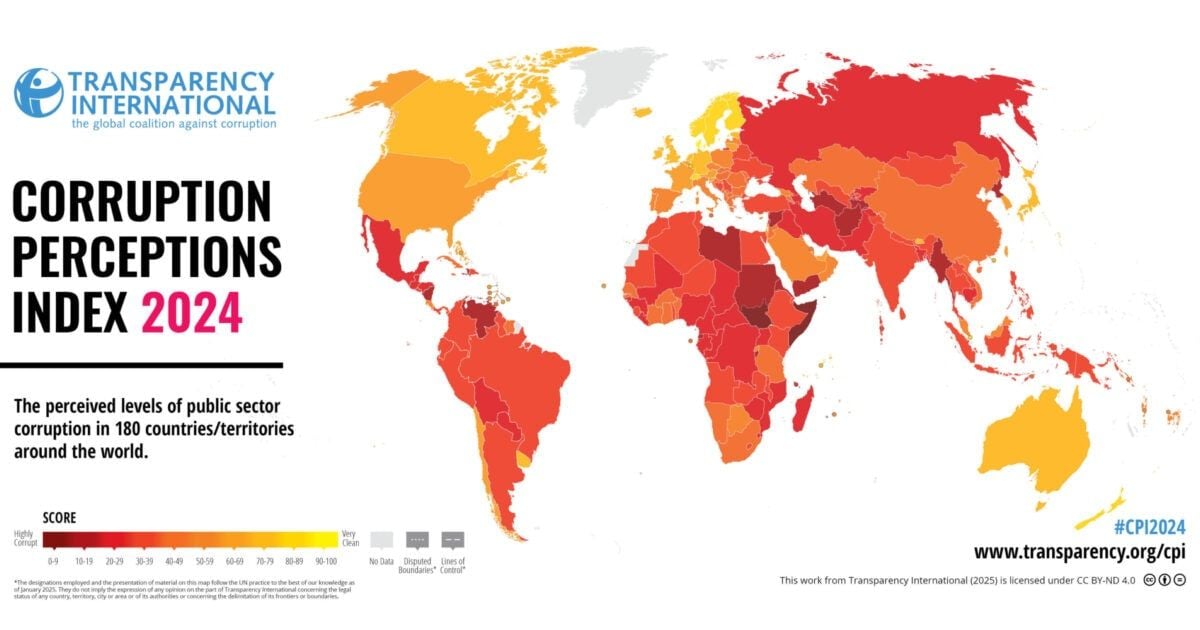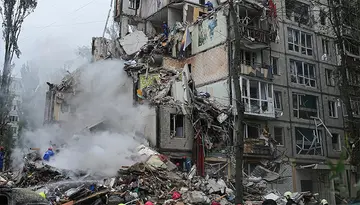India’s Corruption Woes Deepen: CPI Rankings Signal Governance Crisis


Anie Anna Thomas
Published on Feb 14, 2025, 03:36 PM | 5 min read
New Delhi: The 2024 Corruption Perceptions Index (CPI), released by Transparency International, paints a troubling picture for India. The country’s score has dropped to 38 out of 100, down from 39 in 2023 and 40 in 2022, marking a consistent decline over the past three years. India now ranks 96 out of 180 countries and territories surveyed, raising urgent questions about the effectiveness of the BJP-led NDA government’s anti-corruption measures and its commitment to transparency and accountability.
Declining CPI Score Highlights Governance Failures
The CPI ranks countries based on perceived public sector corruption, using a scale from 0 (highly corrupt) to 100 (very clean). India’s persistent decline reflects growing concerns about its political and economic governance. The 2024 report coincides with allegations of crony capitalism, lack of accountability, and favoritism toward corporate entities under the current administration. Despite the BJP-led government’s promises to root out corruption, the CPI score suggests these claims remain largely unfulfilled.
Several high-profile corruption cases have emerged during Prime Minister Modi’s tenure, exposing systemic governance failures. The Adani Group scandal is among the most controversial, with reports alleging the conglomerate paid $265 million in bribes to secure solar power contracts. Further accusations claim the Modi government relaxed national security regulations near the Pakistan border to benefit Adani’s Khavda renewable energy project. These allegations have sparked concerns about the ruling party’s prioritization of corporate interests over national security.
 Undated photograph of Narendra Modi, Gautam Adani and and Vibhav Kant Upadhyay
Undated photograph of Narendra Modi, Gautam Adani and and Vibhav Kant Upadhyay
Electoral Bonds Scheme: A Tool for Political Bribery
Introduced in 2018, the Electoral Bonds Scheme was touted as a reform to enhance transparency in political donations. However, investigations reveal it has become a channel for funneling vast corporate funds to the ruling BJP. Data from the Association for Democratic Reforms (ADR) in 2023 shows over 60% of these donations went to the BJP, underscoring corporate influence over policy making. The anonymity of donors has effectively institutionalized political bribery, consolidating the ruling party’s power and granting corporations undue sway in governance.
Selective Enforcement of Anti-Corruption Laws
While the BJP’s corporate allies thrive without scrutiny, opposition leaders in states like Kerala, Tamil Nadu, Jharkhand and Delhi face intense investigations, tax raids, and CBI cases. Central agencies like the CBI and ED have been used to target political opponents rather than address actual corruption. This politicization of investigative agencies has led to accusations that the Modi government is consolidating power at the expense of genuine anti-corruption efforts, undermining public trust in its fairness and integrity.
The Adani Group and Regulatory Failures
The 2023 Hindenburg Research report accused the Adani Group of stock manipulation and fraudulent accounting practices. Instead of initiating an independent investigation, the Modi government shielded Adani from scrutiny, eroding the credibility of regulatory bodies like SEBI and RBI. This reluctance to address the allegations has further diminished public trust, suggesting the government prioritizes business interests over transparency and accountability.
Systemic Issues Exacerbating Corruption
Despite claims of combating corruption, weak enforcement of anti-corruption laws remains a significant concern. Opposition figures face intense scrutiny, while those linked to the ruling party often escape significant inquiry. This selective enforcement creates a perception of double standards, undermining confidence in the government’s ability to address corruption effectively.
The rise of crony capitalism has also allowed a few powerful business groups to dominate key sectors, stifling fair competition and economic transparency. This concentration of power undermines India’s economic integrity, making it more vulnerable to corrupt practices.
Additionally, the compromise of independent institutions like the CBI, ED, and SEBI has eroded their credibility. Coupled with a lack of protection for whistleblowers, this has created a culture where exposing corruption is discouraged, further stifling accountability efforts.
India Falls Behind as Neighbors Strengthen Governance
India’s continued decline in the CPI rankings places it closer to nations like Somalia, South Sudan, and Syria, known for severe corruption crises. This trend undermines its aspirations as a global leader.
In contrast, South Asian neighbors show more favorable progress. China has improved its CPI score to 45, reflecting sustained anti-corruption measures and governance reforms. Bhutan, a model of good governance, excels with a score of 68, driven by its emphasis on Gross National Happiness (GNH) and transparent practices. Even Pakistan, with a score of 28, has made gradual progress through anti-corruption reforms and digital initiatives.
India’s position underscores the need for robust measures to tackle corruption effectively. Learning from neighbors like China and Bhutan, India could strengthen anti-corruption institutions, enhance transparency, and foster a culture of accountability to reverse its downward trend.
Corruption’s Global Toll on Economy, Governance, and Climate
The 2024 CPI highlights corruption as a persistent global issue, affecting governance, economic growth, and human rights. While 32 countries have improved since 2012, 148 nations have stagnated or worsened, exposing deep-rooted failures in tackling corruption. Countries like Somalia (12), South Sudan (13), and Syria (14) remain at the bottom, struggling with instability, weak institutions, and rampant bribery.
Wealthy nations also play a role in sustaining corruption worldwide. Financial hubs in these countries facilitate illicit transactions, money laundering, and the movement of corrupt funds linked to environmental destruction and other crimes. Additionally, their support for industries like fossil fuels exacerbates the climate crisis.
The report stresses that corruption is a growing global threat requiring long-term, concrete action. Without urgent intervention, billions will continue to suffer under governance systems that prioritize power and wealth over transparency and accountability. A global commitment to fighting corruption is essential to protect democracy, promote stability, and ensure a sustainable future.










0 comments